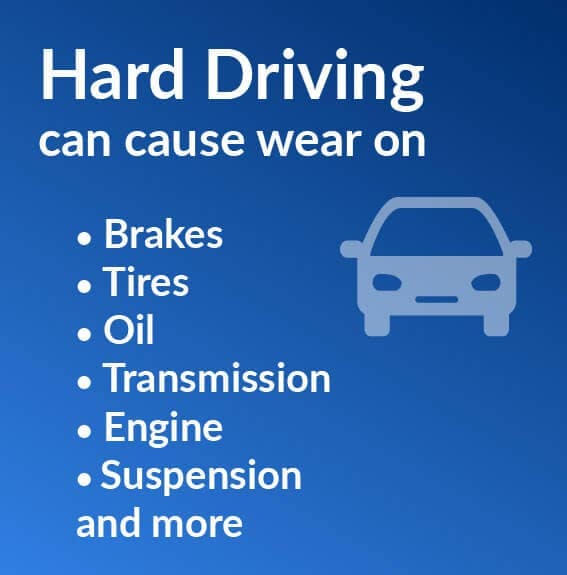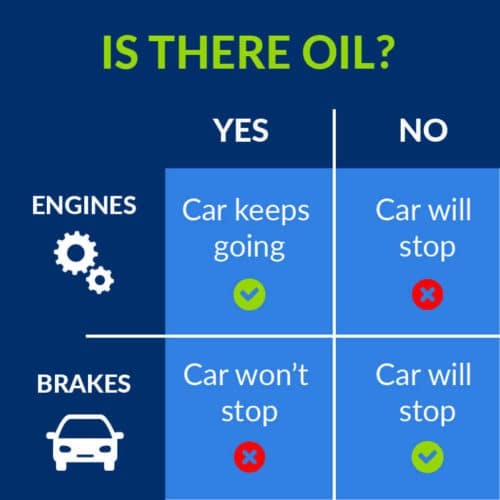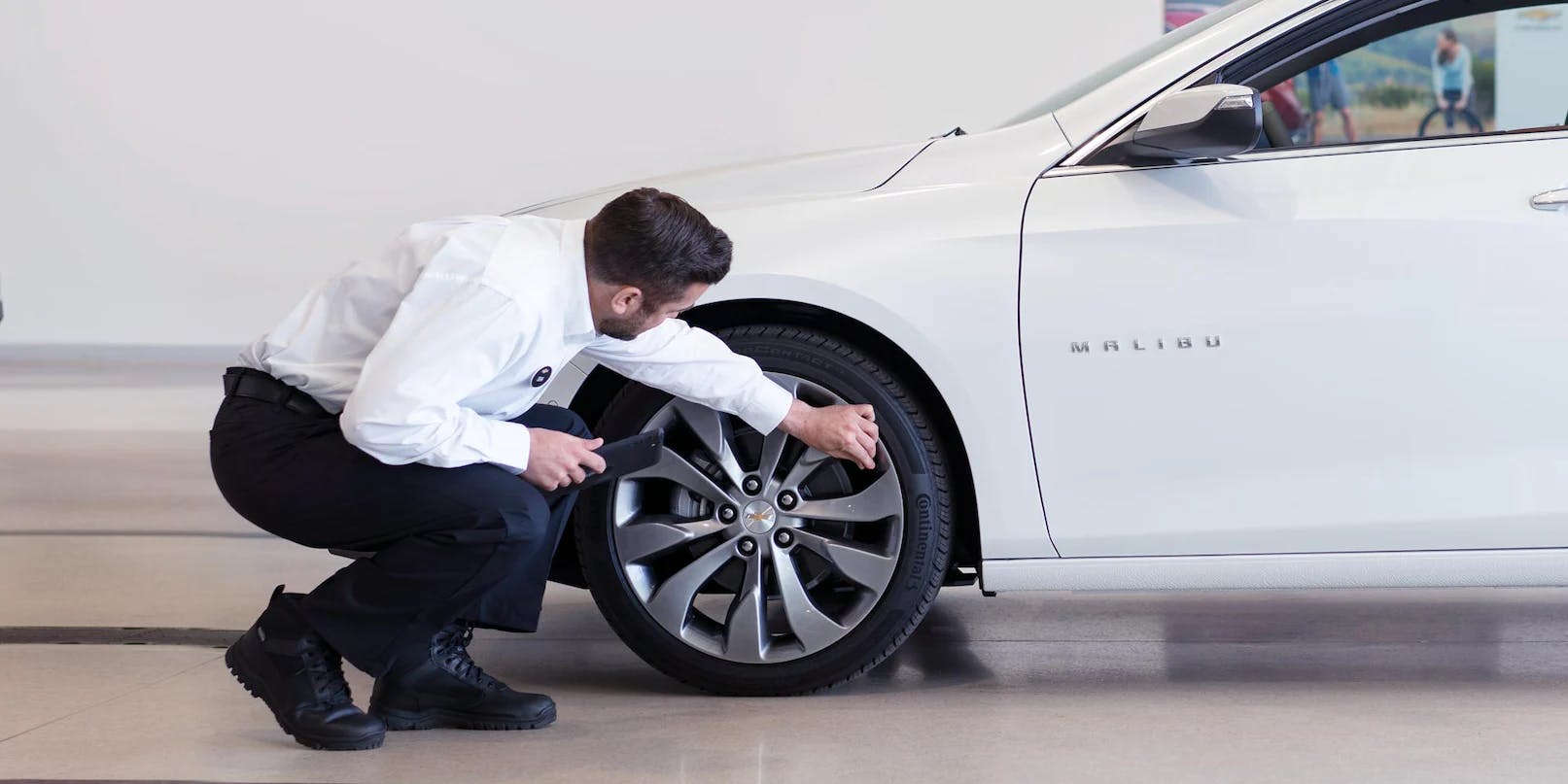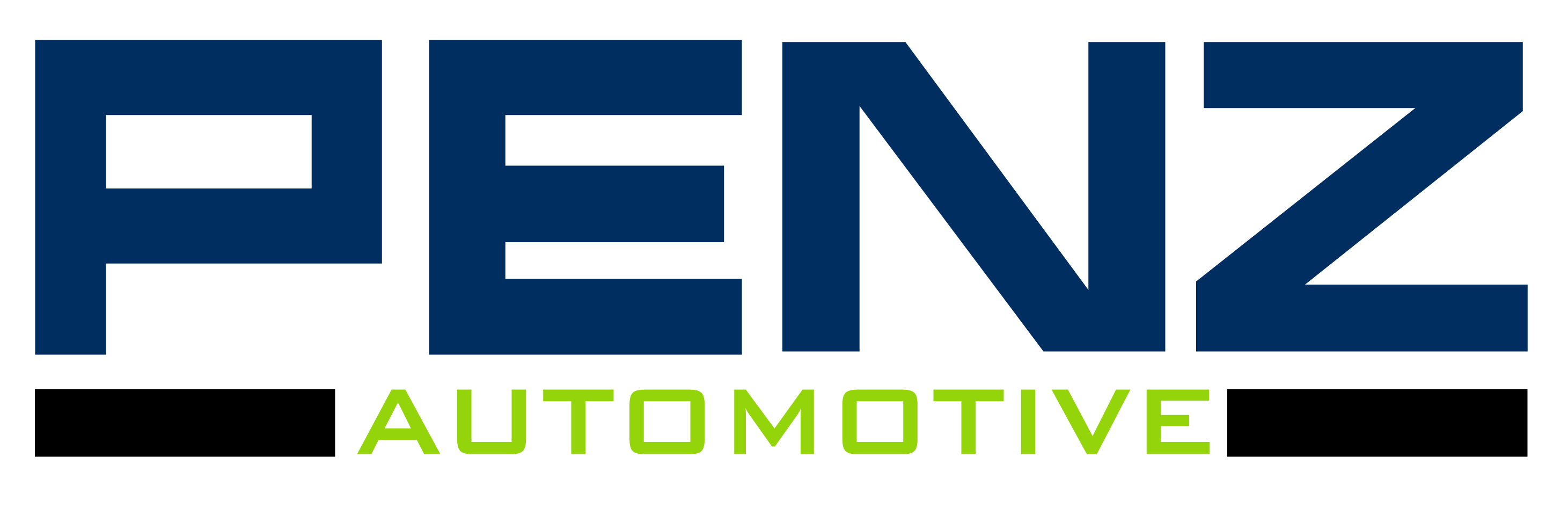The main things that make all used vehicles different from one another include the following basic factors.
These are the biggest questions to ask when shopping for a pre-owned vehicle:
Does it matter a used vehicle’s previous owner had a lead foot or drove like a grandma going to church Sunday morning with a hot dish in the driver’s seat?
Yes, it does.
Driving fast, accelerating quickly, and slamming on the brakes puts more stress on your car. Regular maintenance items such as tires, brakes, and oil can wear faster with aggressive use, but you can also increase wear on things like your transmission, your engine, and your suspension. The harder your car needs to work to do what you want it to, the quicker it will start to age.
Items like your brakes and tires need to be replaced normally, but things like a vehicle’s transmission, engine, clutch, and suspension require less frequent upkeep. If you live in Minnesota and your transmission goes out before you get rust on your rocker panels, you might be doing something wrong. Mild driving habits can also represent increased care and caution for the vehicle as a while. Who do you think is less likely to keep up with regular maintenance on their car–someone who drives cautiously and moderately, or someone who redlines every time they leave a red light? You want to play the odds.

In general, it doesn’t really matter where a vehicle was driven unless the answer includes or excludes any of the following factors:
There is no such thing. (try the search yourself: Google Rochester Used Car Factory). What this means is that every used car is completely unique. No two are alike.
When the sales people are explaining is that there is only 1 of each used car and there will only ever be 1. You can’t custom-order a used car, nor can you find a vehicle with 3 particular scratches or marks in the precise places you want.
So how can you be sure to buy a reliable, high-quality used car? Make sure to check these things when you shop. Even if you can’t ask the previous owner, look over the vehicle and ask yourself or the seller these questions.
While these things aren’t deal breakers, if you’re considering a used vehicle that meets any of these criteria, you should dive deeper into any related systems that may be affected.
For example, if you’re buying a Wrangler Rubicon for actual off-road use, it might not be a bad things if it was already used off road. However, you should certainly make sure things like the suspension, clutch, underbody, and rims are in good shape and good, working condition. Or, if you’re looking at a vehicle that spent most of its time on the beach in Florida, you may want to make sure it was given regular, thorough car washes to clean out the salt water from the entire vehicle.
Highway mileage can frequently be a positive factor, as it means there were fewer on/off engine cycles with all the metal in the engine expanding and contracting again with heat. Chances are the transmission got less wear as well, as the vehicle would have spent most of its miles on overdrive or highest gear, without shifting back and forth as much. It also means less wear and tear on the brakes, suspension, structural components. However, you may have more rock chips on the front of the hood.
Two extremes could be used to answer this question. The first extreme would be complete adherence to all manufacturer’s recommended maintenance items, at the manufacturer’s dealerships only, with proactive replacement of wearing parts using original equipment only. The opposite extreme would be, “We never changed the oil. Runs great though.” Most used vehicles will have a medical history somewhere in-between those two extremes.
Regular oil changes are definitively the most important regular maintenance item for your vehicle. These should occur every 4000-8000 miles, depending on the year, make, model, and type of oil used. To better understand, compare the components in your engine with your brakes. Your brakes have friction in order to stop your car. If you put oil on your brakes, there won’t be friction and your car won’t stop when you press the brakes. But your engine SHOULD have oil in it. If it doesn’t have oil, it will start to function like your brakes, creating friction and eventually stopping your car. So, you need oil in your engine because you don’t want it to stop your car. If the vehicle used full synthetic oil, there will be the least amount of build-up in the engine. Semi- or regular oil may create additional build-up in the engine. While this might never cause an issue, there is something to be said about only using full synthetic. What really matters though is the actual condition of the engine. If it runs well, doesn’t have any codes, funny noises, or abnormal vibrations, there’s a good chance it will last a long time even if it only used regular oil. The type of oil doesn’t matter nearly as much as the frequency of regular oil changes and the presence of oil at all times.
Just remember the following things once you buy your next used vehicle: Change your oil. Period.

While not as crucial as oil changes, preventative maintenance and larger routine updates may have a big impact on the quality of a used vehicle. Things like transmission fluid flushes, wheel bearings, spark plugs, and other things are important to replace when they are due. While some cars may last a long time on the original components, your chances of getting 200k + miles out of a vehicle are greatly increased with factory-recommended maintenance.
Does it really matter if a vehicle has OEM parts? What are OEM Car Parts anyway?
Some factory-original parts are more important than others. Things like window wipers, air filters, and oil filters aren’t critical to be original. But things like electronics, sensors, and mechanical parts typically work much better and longer when they are correct OEM.
There are some labels you’ll see on after market parts.
These mean different things. However, none of them mean they are the actual, factory-original, OEM parts.
The only place you can get actual OEM parts is from franchise, licensed dealerships. Any place you can buy a brand-new car will have OEM parts.
Sometimes you can work through an independent shop that will use and sell actual OEM parts, but most of the time what happens is they order these parts from your local dealership and then sell them to you through their shop.
Especially if you live in Minnesota, you need to wash your vehicle. The salt and brine that is put on the roads before, during, and after a snow storm will have a destructive effect on your vehicle if it sits on there for too long. What happens is that the salt creates corrosion on any exposed metal (except on aluminum, like on some Ford F150s). This corrosion spreads and can sometimes expand even under protected surfaces with things like paint, bed-liners, and rust-proofing.
Paint and rust protection work wonders in Minnesota, especially if applied before any rust is present. They also help prevent rust even if applied later on in a used car’s life. But even so, you need to wash your vehicle, every few weeks at minimum in Minnesota winters, maybe once a month at least in the summer.
Interior fabrics and carpet should also be cleaned, just like in your house. It is usually pretty obvious if the interior of a vehicle wasn’t cleaned enough. There will be visible stains and noticeable odors. Some people will find various wear and smells acceptable, but others will not. It’s really best to actually sit in and drive a used car yourself if you’re considering buying it. Smell is the one thing that cannot be accurately described online.
Just wash your car, folks.

Especially if you live in Minnesota, you need to wash your vehicle. The salt and brine that is put on the roads before, during, and after a snow storm will have a destructive effect on your vehicle if it sits on there for too long. What happens is that the salt creates corrosion on any exposed metal (except on aluminum, like on some Ford F150s). This corrosion spreads and can sometimes expand even under protected surfaces with things like paint, bed-liners, and rust-proofing.
Paint and rust protection work wonders in Minnesota, especially if applied before any rust is present. They also help prevent rust even if applied later on in a used car’s life. But even so, you need to wash your vehicle, every few weeks at minimum in Minnesota winters, maybe once a month at least in the summer.
Interior fabrics and carpet should also be cleaned, just like in your house. It is usually pretty obvious if the interior of a vehicle wasn’t cleaned enough. There will be visible stains and noticeable odors. Some people will find various wear and smells acceptable, but others will not. It’s really best to actually sit in and drive a used car yourself if you’re considering buying it. Smell is the one thing that cannot be accurately described online.
Just wash your car, folks.
All of these things can be a mystery if you don’t know what your looking for, but one thing can help you make some inferences about the condition of a used vehicle. If you buy a vehicle from a trusted friend or family member and you know they took car of their vehicles, you have a good chance at getting a great deal on a reliable used car. However, in most cases when you purchase a used vehicle, you will not have any information about the previous owner. This is why it is important to notice the signs of wear and care and to always take the vehicle to an expert mechanic for inspection.
When you buy a used car from a reputable dealership–particularly one who also sells brand new cars–you have the confidence of knowing these things were looked over and meticulously addressed. The reason that new car dealers have good used cars is that their reputations are extremely important. After all, these dealers have the brand names of some of the largest companies in the world, such as General Motors, Ford, Toyota, etc. You can bet that Toyota doesn’t want its name on a franchise dealer that sells junky used cars alongside brand-new Land Cruisers.


| Monday | 8:30 AM - 8 PM |
| Tuesday | 8:30 AM - 8 PM |
| Wednesday | 8:30 AM - 8 PM |
| Thursday | 8:30 AM - 8 PM |
| Friday | 8:30 AM - 6 PM |
| Saturday | 8:30 AM - 6 PM |
| Sunday | Closed |
| Monday | 7 AM - 6 PM |
| Tuesday | 7 AM - 6 PM |
| Wednesday | 7 AM - 6 PM |
| Thursday | 7 AM - 6 PM |
| Friday | 7 AM - 6 PM |
| Saturday | 8 AM - 5 PM |
| Sunday | Closed |
| Monday | 7 AM - 6 PM |
| Tuesday | 7 AM - 6 PM |
| Wednesday | 7 AM - 6 PM |
| Thursday | 7 AM - 6 PM |
| Friday | 7 AM - 6 PM |
| Saturday | 8 AM - 5 PM |
| Sunday | Closed |

| Monday | 8:30 AM - 8 PM |
| Tuesday | 8:30 AM - 8 PM |
| Wednesday | 8:30 AM - 8 PM |
| Thursday | 8:30 AM - 8 PM |
| Friday | 8:30 AM - 6 PM |
| Saturday | 8:30 AM - 6 PM |
| Sunday | Closed |
| Monday | 7 AM - 6 PM |
| Tuesday | 7 AM - 6 PM |
| Wednesday | 7 AM - 6 PM |
| Thursday | 7 AM - 6 PM |
| Friday | 7 AM - 6 PM |
| Saturday | 8 AM - 5 PM |
| Sunday | Closed |
| Monday | 7 AM - 6 PM |
| Tuesday | 7 AM - 6 PM |
| Wednesday | 7 AM - 6 PM |
| Thursday | 7 AM - 6 PM |
| Friday | 7 AM - 6 PM |
| Saturday | 8 AM - 5 PM |
| Sunday | Closed |

| Monday | 8:30 AM - 5:30 PM |
| Tuesday | 8:30 AM - 5:30 PM |
| Wednesday | 8:30 AM - 5:30 PM |
| Thursday | 8:30 AM - 5:30 PM |
| Friday | 8:30 AM - 5:30 PM |
| Saturday | 8:30 AM - 2 PM |
| Sunday | Closed |
| Monday | 8 AM - 5:30 PM |
| Tuesday | 8 AM - 5:30 PM |
| Wednesday | 8 AM - 5:30 PM |
| Thursday | 8 AM - 5:30 PM |
| Friday | 8 AM - 5:30 PM |
| Saturday | 8 AM - 1 PM |
| Sunday | Closed |
| Monday | 8 AM - 5:30 PM |
| Tuesday | 8 AM - 5:30 PM |
| Wednesday | 8 AM - 5:30 PM |
| Thursday | 8 AM - 5:30 PM |
| Friday | 8 AM - 5:30 PM |
| Saturday | 8 AM - 1 PM |
| Sunday | Closed |

| Monday | 8:30 AM - 8 PM |
| Tuesday | 8:30 AM - 8 PM |
| Wednesday | 8:30 AM - 8 PM |
| Thursday | 8:30 AM - 8 PM |
| Friday | 8:30 AM - 6 PM |
| Saturday | 8:30 AM - 6 PM |
| Sunday | Closed |
| Monday | 7 AM - 6 PM |
| Tuesday | 7 AM - 6 PM |
| Wednesday | 7 AM - 6 PM |
| Thursday | 7 AM - 6 PM |
| Friday | 7 AM - 6 PM |
| Saturday | 8 AM - 5 PM |
| Sunday | Closed |
| Monday | 7 AM - 6 PM |
| Tuesday | 7 AM - 6 PM |
| Wednesday | 7 AM - 6 PM |
| Thursday | 7 AM - 6 PM |
| Friday | 7 AM - 6 PM |
| Saturday | 8 AM - 5 PM |
| Sunday | Closed |

| Monday | 7 AM - 5:30 PM |
| Tuesday | 7 AM - 5:30 PM |
| Wednesday | 7 AM - 5:30 PM |
| Thursday | 7 AM - 5:30 PM |
| Friday | 7 AM - 5:30 PM |
| Saturday | Closed |
| Sunday | Closed |